The War To Sell You A Mattress Is An Internet Nightmare
One day in the spring of 2016 I mentioned to a friend that I needed a new mattress. Mine was a sunken hand-me-down that had become about as comfortable as concrete.
“I know a guy who can give you a free mattress,” my friend said.
This sounded too good to be believed, but my friend protested it was true: “This guy Kenny, he reviews mattresses online, and companies just send them to him. He can’t get rid of them fast enough.” Not long after came the email introduction: “David, meet Kenny.”
Journalists aren’t supposed to accept freebies. But the one thing I was certain of was that I would never write an article about online mattress reviewing, a subject so self-evidently boring that I became a little sad just imagining it. So when Kenny replied that he expected to have a mattress to offload soon, I only asked him what sort of wine he liked.
Kenny Kline turned out to live just blocks from me in Brooklyn, and I walked over a few days later with a nice bottle of red under one arm. Kenny buzzed me in and I stepped inside the entryway, where I found a queen-size mattress already waiting for me, ready to grab and go if I pleased. But I wanted to give Kenny his wine.
I called up to Kenny, and he emerged from his apartment to greet me on the stairs. He was tall and good-looking, with a kind of brogrammer affability. Later I’d learn he had studied physics and finance at Washington University in St. Louis, where he rowed crew and was a Beta Theta Phi brother. I’d also look up some of his mattress reviewing videos.
I asked Kenny about his unusual hobby, figuring that reviewing mattresses was something he did for beer money. But he surprised me by saying that this was what he and his business partner, a guy named Joe Auer, did for a living; their two websites, Mattress Clarity and Slumber Sage, were exclusively dedicated to reviewing mattresses.
Kenny told me that in the last few years, numerous mattress reviewing websites had sprung up. Then he made a strangely implausible claim: Just a few days before, the mattress e-commerce company Casper had sued three bloggers–competitors of Kenny’s–whose reviews Casper didn’t like. Kenny and his business partner, fortunately, had been spared.
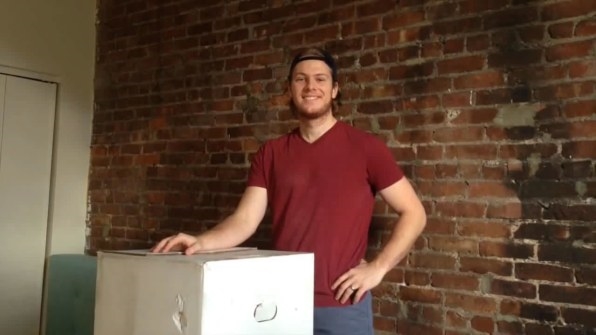
I called an Uber and hauled my free mattress up to my third-floor walkup apartment. The mattress had a poofy marshmallowy top that I didn’t quite love, but you get what you pay for. I got used to it as the months went by.
I might have forgotten about Casper’s rumored lawsuits altogether, if the mattress brand hadn’t kept following me everywhere I went. That summer and through the fall, Casper ads sprouted all over New York: beautiful ads, often lining subway cars, featuring cartoon creatures curled up together on mattresses. In Casper’s cartoons, even the big bad wolf slept peacefully next to three little pigs.
In October I wrote Kenny to ask what became of those lawsuits. “One of the bloggers just publicized it,” Kenny wrote back, providing a link to a website, Sleepopolis.com.

“Casper Sues Sleepopolis with Federal Lawsuit,” read the headline on the page I opened. The post was written by a guy named Derek Hales, the site’s proprietor. Derek’s photo showed a pale, skinny twentysomething with freckles and short red hair. I clicked around on his site. Derek Hales evidently took mattress reviewing seriously, rating the firmness of mattresses on a scale from one to 10, cutting them open to measure the exact thickness of the foam.
I returned to the page outlining the lawsuit.
“From the very first day Sleepopolis launched I knew I wanted to build something different,” wrote Derek. “Reviews rooted in honesty, transparency, integrity, and clarity, without the marketing speak or fluff. Guided by these principles I feel like Sleepopolis readers have the right to know that Casper Sleep has filed a federal lawsuit in New York, suing both Sleepopolis and me, personally.”
So it was true. I scratched my head. Casper was on its way to becoming a 750-million-dollar company. It was the hottest of the bed-in-a-box disruptors, with investments from celebrities like Ashton Kutcher and Nas. And it was picking on some skinny blogger from Arizona?
I called my editor and confessed that in a moment of weakness I had accepted a free mattress from an online mattress reviewer named Kenny, and that I wanted to write about this bizarre industry and its even more bizarre David-and-Goliath legal battle.
I couldn’t know it then, but the outcome of that battle would influence the purchase decisions of many thousands, if not millions, of people seeking a good night’s sleep. It would also reveal just how thoroughly the internet and the businesses that thrived there had blurred the lines between product reviews and advertisements. All I’d wanted was a mattress, but what I got was a look at a little-known and hugely lucrative annex of e-commerce, one where the relationships can often get a little too comfy—until they’re not.
I wanted to learn how Derek Hales had gotten into mattress reviewing, so I called him up in Arizona. He had the nerdy intensity of a Jesse Eisenberg character. Derek told me he’d always been entrepreneurial; he’d helped pay his college tuition by creating a World of Warcraft blog. After graduating from Kansas State in 2010 with a business degree, he spent the next few years working for a company outside Phoenix, doing search engine optimization, or SEO, the art of getting web pages to rank higher in Google searches.
In 2012, Derek messaged Samantha Niezwaag, a math teacher, on ChristianMingle.com. “The emails soon turned into novels,” Samantha would later recall. Both had grown up in the Midwest and the South; both were obsessed with Lord of the Rings. A flirty conversation turned to the question of whether they could squeeze 78 dates into 25 weeks, which Derek remarked would mean 3.12 dates per week.
“When he gave me two decimal places,” said Samantha, “he had me hooked.” On their engagement website, Samantha called Derek “Godly, passionate, loyal, supportive, ambitious, intelligent, and funny”; they got married in May of 2014.
The young husband and wife needed a new mattress, but were shocked by the prices at the local mattress store: the average queen-size was around $1,500, but as much as $5,000 for a fancy Tempur-Pedic. One of Derek’s coworkers told him about a two-year-old Phoenix-based company called Tuft & Needle, which sold its queen-size mattress directly to consumers online for just $600. Though buying such a large item online felt a little unusual, there was a 100-day trial period, so what was the risk?
When it arrived, Derek and Samantha found the Tuft & Needle too firm for their tastes, so they organized a donation pickup and received their refund. Then they tried their luck with another online mattress company called Casper, which had just launched. When their Casper mattress arrived, Derek and Samantha found they liked it enough to keep it.
A few weeks later, in September of 2014, Derek spotted an opportunity. He registered the domain Sleepopolis-Mattress-Reviews.com and threw together a quick website comparing his experiences with Tuft & Needle and Casper (he eventually migrated his content to Sleepopolis.com, which he had also registered). A week later, Derek and Samantha posted a positive video review of their Casper on YouTube.
“Pretty quickly, it seemed I had struck a chord with a lot of people,” Derek recalled. The Casper video eventually racked up 25,000 views.
From the beginning, Derek monetized his site and YouTube channel using what are called “referral links,” or “affiliate links.” These special links were embedded with a tracking code. If a consumer clicked from Derek’s site through to a mattress company’s website (like Casper.com) and made a purchase within 30 days or so, then that company would pay Derek a reward.
For each mattress he reviewed, Derek would either negotiate a commission structure directly with the mattress company, or accept an existing offer via an intermediary site like ShareASale.com (which has aggregated these so-called affiliate marketing opportunities since 2000). Then Derek would put the affiliate links at the bottom of his reviews. Sometimes these links took the form of a digital coupon users could click, which would apply a discount at checkout.
Derek disclosed the nature of these affiliate relationships in a corner of his website, though not the exact terms. In those first months, he told me, Derek typically received a $50 digital Amazon gift card for every mattress sold (or 5% on a roughly $1,000 mattress, a commission rate that had become standard in affiliate marketing).
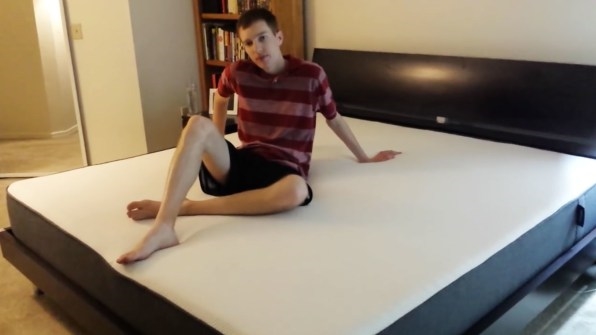
Affiliate marketing is about as old as e-commerce, but the industry got a kick-start after Amazon.com launched an affiliate program in 1996. The industry has since ballooned, with around $4.5 billion changing hands in 2016 just in the U.S. Affiliate marketing is even becoming an important source of revenue for legacy publishers like The New York Times: Last year the paper paid $30 million for two review sites, The Wirecutter and The Sweethome, which have built a bustling business around affiliate links. But a much larger share of the affiliate marketing economy is made up of people like Derek Hales, stray blogger-entrepreneurs who hunt for emerging categories of products that consumers are seeking guidance on, then jockey for top position in related Google searches (like “best mattresses” or “mattress reviews”).
Derek was smart and talented, but he was also lucky. Through a series of coincidences–getting married in May 2014; living in Phoenix, where Tuft & Needle was based; disliking that mattress and trying a Casper instead; having some SEO savvy–he had stumbled into early-mover advantage in a category primed to explode.
“There was a waterfall of companies launching,” he recalled. Nipping at the heels of Casper and Tuft & Needle came other direct-to-consumer mattress companies like Leesa, Yogabed, Purple, and GhostBed; in time, over 100 brands in all. Most were new companies, while others were e-commerce divisions from legacy brands scrambling to make up lost ground amidst a tectonic shift in how consumers were beginning to buy mattresses. In the $14 billion U.S. mattress market, online mattresses only made up $300 million in sales two years ago; this year, sales may reach $1.2 billion. All of these emerging brands wanted Derek to review their products like he had the Casper–and all were willing to pay Derek a bounty. Like Kenny Kline in Brooklyn, Derek was soon handing out free mattresses he’d reviewed to his Phoenix friends and neighbors, and eventually had mattresses piling up in a spare room.
In February 2015, Derek quit his day job to focus on Sleepopolis.

It was a smart gamble. In the months and years that followed, Derek would build his site into the most-trafficked web destination for people seeking information on mattresses, beating out a raft of competitors. In total, his YouTube reviews have garnered 2.5 million views, while the site itself would grow to attract over half a million visits every month. If you happened to search for mattress reviews online in the last three years, odds are you landed on Sleepopolis. Derek built his site into the number-one Google hit for countless popular queries related to mattresses.
Our phone call taught me a great deal about this strange backwater of the internet economy. But a mystery remained. Throughout those first, heady months, Derek maintained a good relationship with Casper. How, then, by late 2016, had it gone so sour?
I asked Derek, but he couldn’t tell me. With Casper’s lawsuit against him pending, Derek’s lawyer forbade him from even mentioning the company by name. I would have to dive into a growing stack of mattress lawsuits to find out.
As Casper flourished through 2014 and early 2015, I learned, it enjoyed a mutually beneficial relationship with Sleepopolis and similar sites. For many bloggers, in fact, Casper was among the first mattress companies to offer affiliate commissions, leading its competitors to respond in turn. The reviews sites were key parts of what marketers call the “purchase funnel,” converting a vague interest in mattresses into awareness of a specific brand, and often the decision to buy it. Many consumers were Googling terms like “best mattress,” landing on sites like Sleepopolis, and learning about e-tailers like Casper for the first time.

Indeed, one would never have predicted looming lawsuits from a friendly 2015 email exchange, in which Casper CEO Philip Krim attempted to court an affiliate marketer named Jack Mitcham, who ran a Sleepopolis-like site called Mattress Nerd.
In January 2015, Krim wrote Mitcham that while he supported objective reviews, “it pains us to see you (or anyone) recommend a competitor over us.”
Krim went on: “As you know, we are much bigger than our newly formed competitors. I am confident we can offer you a much bigger commercial relationship because of that. How would you ideally want to structure the affiliate relationship? And also, what can we do to help to grow your business?”
When Mitcham responded to say that he and his wife found the Casper mattress uncomfortable, Krim persisted:
“Is there any way I could get you to spend more time on the Casper?…We would even be happy to fly you out to NYC to tell you more about the product or have you spend a long weekend on one. I’d also love to find ways to work more closely. We would love to become your biggest referral check.”
Krim then upped his offer, promising to boost Mitcham’s payouts from $50 to $60 per sale, and offering his readers a $40 coupon. “I think that will move sales a little more in your direction,” replied Mitcham on March 25, 2015. In the months that followed, Mattress Nerd would become one of Casper’s leading reviews site partners. (The emails surfaced due to another mattress lawsuit, GhostBed v. Krim; if similar correspondence exists with Derek Hales, it has not become public.)
Just a few months later, in June 2015, something big happened that would ripple through the whole mattress ecosystem: Casper received $55 million in Series B investment at an implied half-billion-dollar valuation, making it the front-runner in the online mattress wars.
The company started spending relentlessly on advertising, and soon just about everyone had heard of Casper, giving the startup a measure of escape velocity from its competitors. Casper’s sales topped $200 million last year, though it declines to say whether it is profitable. Fortune has estimated Casper’s annual marketing budget to be $80 million.
As Casper grew, more mattress reviews sites began mushrooming up in its shadow, earning quick commissions while creating little value for Casper. Casper decided to allow the contracts it held with affiliates to expire, “to reassess the situation,” Casper CEO Krim told me.
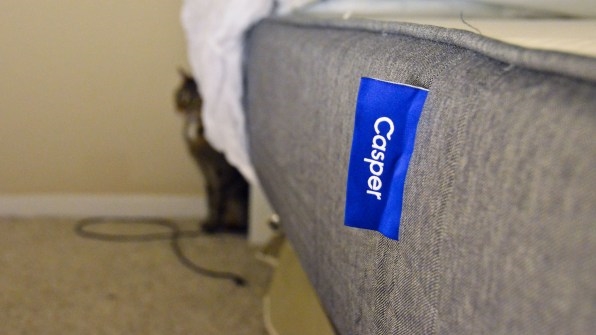
In July 2015–a month after the $55 million investment–Krim revived his email chain with Mattress Nerd’s Mitcham, informing him that while Casper had “decided to sunset” its affiliate relationships, it nevertheless would be interested in exploring “economic relationships beyond the affiliate program structure.”
“Nothing would make us happier than to pay you a ton of money,” Krim elaborated in his next email, “but we need to do it in a context of being accretive to Casper. Currently you actively endorse a competing product on our review page. What can we do not to have you endorse another product as superior to ours? I am certain we can be a better partner to you than Leesa.”
It appears that Krim’s dialogue with Mattress Nerd did not end in a comfortable place. Likewise for negotiations Krim may have been having with Sleepopolis or Sleep Sherpa. That summer, Casper declined to renew affiliate relationships with all mattress bloggers. (It eventually reinstated some.)
An antagonism set in between Casper and at least some of these reviewers, a few of whom conspicuously began to downgrade their assessment of the company’s mattress, and to more vocally favor competitors that did still pay commissions, like Leesa.
By April 2016, Derek had updated his assessment of the Casper too, writing that, after 18 months of reviewing competing mattresses, he could no longer recommended the mattress. He even added a little yellow box near the top of that page, which read: “Thinking about buying a Casper? Do your homework! Check out these 4 mattress companies that Sleepopolis loves.”
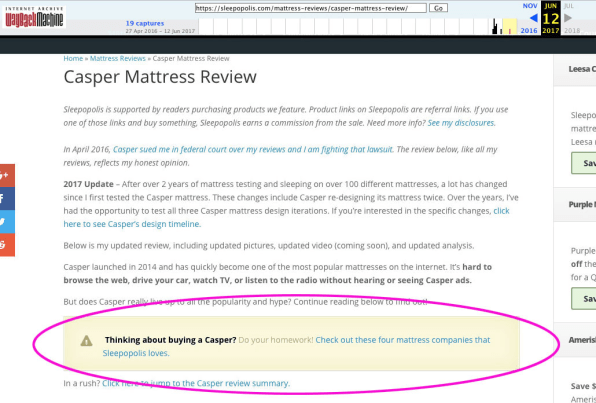
That little yellow box was a huge thorn in Casper’s side. If you Googled the search term “casper mattress review,” which about ten thousand people did per month, the first webpage Google served up was Derek’s review, with its poison box. Derek ranked first for that query, too.
On April 29, 2016, Casper filed lawsuits against the owners of Mattress Nerd, Sleep Sherpa, and Sleepopolis (that is, Derek), alleging false advertising and deceptive practices.
Mattress Nerd and Sleep Sherpa quickly settled their cases, and suddenly their negative Casper reviews disappeared from their sites, in what many onlookers speculated was a condition of the settlements. But by the end of 2016, when I started closely studying the lawsuits, Derek’s Casper review remained, defiantly, up on Sleepopolis. He was soldiering on in his legal battle with the mattress giant. People who knew him called Derek a fighter; one of his nicknames was “Halestorm.”
Casper had another way of referring to him. Derek was “part of a surreptitious economy of affiliate scam operators who have become the online versions of the same commission-hungry mattress salesmen that online mattress shoppers have sought to avoid,” Casper’s lawsuit alleged. The company complained that Derek was not forthright enough about his affiliate relationships, noting his disclosures were buried in a remote corner of his site. This did violate recently issued FTC guidelines, and Derek updated his site to comply.
Casper wanted Derek’s behavior to be stopped, and it wanted monetary damages. “Casper estimates that Sleepopolis’s conduct has caused it millions of dollars of lost sales to date,” wrote Casper’s lawyers.
In a motion to dismiss the case filed in July 2016, Derek blasted what he called Casper’s attempt at censorship. The statements on his site were fundamentally his honest opinions: He claimed he had become less enthusiastic about the Casper–which he still called a good mattress–only because equal or better mattresses had entered the market, sometimes at lower prices. (A Casper queen-size runs $950 today, a Leesa queen $940; Derek’s site also offered coupons that lowered the Leesa’s price.)
In October 2016, after weighing both sides’ arguments, the judge agreed that while most of Derek’s statements were opinions, immune to a lawsuit, Derek had also made some statements of fact on his site: statements like “No review or content is paid for by any manufacturer or sleep company,” and “No member of Sleepopolis is employed by any mattress or sleep company.” If Casper could prove those statements false, it might have a claim for damages.
The judge held that the case could proceed.
The case would now move to the “discovery” phase, in which each side was entitled to acquire documents and deposition testimony from the other.
Derek now faced the prospect of litigating for months, if not years, against a corporate behemoth in New York–a market where his lawyers’ fees were likely to top $750 an hour.
At that rate, how long could Derek afford to go on fighting?
The question of just how much money Derek made off Sleepopolis interested everyone I spoke to. It had even been the subject of a gossipy, if rigorously argued, post on a site positioning itself as a gadfly of the mattress industry, HonestMattressReviews.com. (A court later determined that, despite the site’s name, the owner of Honest Mattress Reviews had concealed ties to the mattress company GhostBed.)
According to the website analysis tool SimilarWeb, Derek referred 1.6 million visits to outside sites between February 2016 and July 2017. Much of this traffic went to Amazon.com (when Derek lacked a direct affiliate relationship, he was able to get at least some money as an affiliate of Amazon). A significant portion went to the mattress companies Purple, Loom & Leaf, and Nest Bedding.
A Loom & Leaf executive told me they had paid Derek $100,000 in 2016; Nest Bedding’s CEO Joe Alexander said he had paid Derek a multiple of that. “My life changed because of Derek,” Alexander told me. “He made me a millionaire.”
But by far the most traffic during that period–some 400,000 visits–was referred out to the website of Derek’s favorite mattress company, Leesa.

Derek’s Leesa favoritism was no secret: he explicitly called it “Sleepopolis’s favorite mattress,” and a sidebar touting Leesa affiliate-link coupons graced nearly every page of the site. Mattress reviewers say their art entails recommending different mattresses to different types of sleepers, but in the 14 categories on his site for which the Leesa was eligible, Derek declared it first in seven of them, second or third in all but two of the rest. The Leesa was Sleepopolis’s best mattress for side sleepers, best mattress for kids, best mattress for back pain, and best mattress for sex.
It was possible that Derek genuinely loved the Leesa above all other mattresses; he’d reviewed it favorably even before Casper cut off his payments. But many people I spoke to suggested that other things were possible, too. If most mattress companies paid around $50 per commission, other companies paid two or three times that, even as much as $250. In one email I saw, an unscrupulous mattress reviewer said companies regularly approached him offering to “buy” top placement on his site; so long as the reviewer liked the mattress, he’d happily negotiate a price. “Honestly, the FTC has to step in at some point and make review sites divulge what they are paid for each bed or brand,” Nest Bedding’s Joe Alexander, told me. “This industry is a freight train out of control.”
Was Leesa playing this highest-bidder game with Sleepopolis? At first, I heard many rumors to that effect. I called Leesa’s CEO David Wolfe in February, in an effort to find out. The middle-aged Wolfe, though now a resident in Virginia Beach, retained a charming British accent, and was a former marketer himself. The mattress industry has long been attractive to marketers, I learned, even before the internet got involved. As a mattress industry analyst recently told Freakonomics Radio: “You have to be a strong marketer to be in the mattress industry, because they’re really selling identical, rectangular slabs.”
Wolfe denied offering higher affiliate rates than competitors, saying he had always paid $50 per mattress, apart from one month when he had paid 60. He later repeated this assertion and had his lawyer call me to confirm it, and said he felt it was important for mattress companies and affiliates to operate on a level playing field.
I asked Wolfe if he had ever offered Derek Hales a guaranteed income. Our friendly conversation took a swift turn. “The answer is no,” he said, adding, “You should leave this to the attorneys.” Later, he added, “I don’t want to say something that could affect a pending lawsuit where Leesa is not a party.”
SimilarWeb suggested that Derek referred 400,000 visits to Leesa.com between February 2016 and July 2017. If you assumed that about one in 12 referred visits ultimately led to a purchase—a conservative estimate according to people in the mattress industry I interviewed—that would suggest Sleepopolis helped sell 33,000 mattresses. Even a $50 commission per mattress meant $1.6 million paid by Leesa to Derek over those 18 months. When I approached Leesa’s David Wolfe with these numbers, he called them inflated (SimilarWeb provides only estimates), but conceded that Derek was essentially Leesa’s top salesman, accounting for 18% of the brand’s total sales, which reached about $80 million last year.
All told, these numbers suggested Derek may have been making as much as $2 million per year by 2016. And his site, in a hypothetical sale, would be worth a multiple of that. (A considerably less trafficked mattress-reviewing site recently went on the market for $1.4 million.)
Derek had made millionaires among the new mattress entrepreneurs–and he himself was one of them. So while Derek’s pockets weren’t nearly so deep as Casper’s, they certainly weren’t shallow. He had stumbled into what was, outside of financial products, one of the more lucrative niches in affiliate marketing. If this was a David-and-Goliath battle, it was worth remembering that David became a king.
Still, when his Manhattan lawyers first quoted their prices, Derek would have discovered that the cost of a fight to the bitter end–a trial by jury–could easily come to well over a million dollars itself.
In February, Derek Hales faced a new salvo: A letter from Casper’s attorney to the judge alleged that while Derek was reviewing Leesa’s mattresses enthusiastically, he was not only receiving affiliate commissions but also payments for SEO consulting he provided Leesa. Reading this, I suddenly understood David Wolfe’s skittishness about the last questions I had put to him over the phone.
At a hearing in March, Derek’s lawyer conceded that the consulting relationship was real; the payments had totaled about $40,000 over 20 months. In a game of millions, though, this was hardly the smoking gun Casper was probably looking for. Ultimately, after months of searching, I was unable to find any major financial inducement for Derek to favor Leesa over other mattress companies that paid him commissions. When I asked Nest Bedding’s Joe Alexander why Derek preferred Leesa, he summed it up for me: “Derek just seemed like the kind of guy who left the dance with the girl he came with.”
Still, even if $40,000 wasn’t tremendous, the mere fact of these side payments undermined some of Derek’s claims on his site, probably harming his case. Around this time, Alexander was speaking to Derek weekly; they’d gradually become friends. The suit was clearly weighing on Derek. “He’d try to keep a good face on things,” Alexander told me, “but you could tell–the hesitation in his voice, the contrived laugh. Things weren’t going along as he had anticipated.”
In the March hearing transcript, there was discussion of momentum toward a settlement, one in which Derek might pay damages to Casper.
But then, in the last days of April, Derek’s lawyer submitted a surprising counterclaim against the mattress giant.
The claim added a dramatic early chapter to the story of Sleepopolis and Casper–right after Casper announced it would not be renewing its affiliate marketing contracts back in the summer of 2015.
“Immediately after Casper announced this termination,” the claim alleged, “Casper approached Hales and offered to resume the relationship, on terms considerably more favorable to Hales, if Hales would agree to state a more positive opinion of Casper’s mattress on Sleepopolis. Hales refused.”
Shortly after this refusal, alleged Derek’s lawyer, “Sleepopolis came under a massive negative SEO attack.” Tens of thousands of links to Sleepopolis began mysteriously cropping up on sites that Google’s algorithms deemed low-quality, he wrote. Since Google demotes websites that are linked to by low-quality sites, Sleepopolis’s esteem was hurt by association, and Google began demoting Sleepopolis in searches. Suspiciously, a large proportion of the toxic links pointed to Derek’s Casper content, particularly hurting him in Casper-related searches. (Derek eventually resolved his problem by hunting down the bad links and creating a “disavow” list for Google.)
Derek’s lawyer, having learned that Casper contracted with a “reputation management firm” at just this time, alleged that Casper was behind the SEO attack on Sleepopolis. His lawyer was now insisting that Derek was the wronged party in the suit, not Casper, and demanded that Derek be awarded damages instead.
Casper’s lawyers soon fired back with a motion to dismiss Derek’s counterclaims–a “thinly spun tale,” they scoffed, with “no evidence linking Casper to the alleged SEO attack.” The newly escalated legal battle hurtled on.
On one of the last days of July, I opened my inbox to find an email from a correspondent, another close observer of Sleepopolis. “Did you see this???” ran the subject line. Inside was a link to Sleepopolis.
The site still looked as it always had: the dark header, the elegant logo featuring a skyline nestled in a crescent moon. But in place of Derek’s smiling face, there was now someone else: a young man in a blue blazer who I didn’t recognize. “Welcome To The New Version Of Sleepopolis!” ran the header.
“Hello!” ran the text beside the headshot. “My name is Dan Scalco and I’d like to personally welcome you to the brand new version of Sleepopolis. Here’s what’s up… On July 25th, 2017 our company acquired Sleepopolis.com …. Derek Hales and Samantha Hales are no longer associated with Sleepopolis.”
An italicized note added:
“In July 2017, a subsidiary of JAKK Media LLC acquired Sleepopolis.com. Casper provided financial support to allow JAKK Media to acquire Sleepopolis.”
This was disorienting, to say the least. What was JAKK Media? It had bought Sleepopolis with a loan from Casper? I typed out a question to my correspondent: “Who is Dan Scalco?”
The reply explained that Dan Scalco worked with someone named Joe Auer, who co-owned two mattress reviews sites. The name seemed vaguely familiar, and I figured his initials accounted for the JA in “JAKK Media.” But who was KK?
Then it hit me.
Kenny Kline, the guy who had given me my free mattress… now owned Sleepopolis.
I called up Kenny, trying to make sense of this strange development. But whatever bond forms between men who have exchanged a bottle of wine for a mattress wasn’t enough for him to violate his NDA.
“It’s kind of a mystery, what happened,” he said, keeping mum about details. “The website came up for sale, and I acquired it.” Kenny said he hoped to repay Casper soon and be able to remove the disclaimer, but for the time being he wanted to err on the side of transparency.
Kenny Kline and Dan Scalco swore that Casper wouldn’t touch the site. Casper’s Philip Krim told me the same: “We exert no influence and have no influence over the site, other than that we lent them money.” A Casper spokesperson added that the company currently has no access to Sleepopolis’s data.
The new owners of Sleepopolis did disclose on the site: “Until the loan is satisfied, Casper has the contractual right to repossess the assets and forgive the remaining value of the loan…yes, that was written by our lawyers ;).” Repossess the assets: in other words, take over Sleepopolis, if it came to that. But Krim said this was just “lawyer language protecting our loan, so we get paid back.”
On the same day in July that Kenny and I spoke, Casper v. Hales was reaching its final stages of settlement, with both parties agreeing to drop the suit. On July 28, 2017, the court deemed the case resolved.
Derek wouldn’t answer my calls. I wasn’t alone in that: Whatever NDA was in place was evidently ironclad. “I was an intimate friend with Derek,” Joe Alexander, the Nest Bedding CEO, told me, “and apparently I can never talk to him again.” His best guess was that Derek sold Sleepopolis in the end for about half what it was actually worth, but still something like $3 million to $5 million. “I’m going to venture to guess Derek is sipping margaritas somewhere, laughing at all of us,” said Alexander good-naturedly. Online, I found a Halloween picture of Derek and Samantha dressed as Neo and Trinity from The Matrix, wearing sunglasses and brandishing toy guns. I imagined them buying a Corvette and speeding off into the sunset, the Bonnie and Clyde of affiliate marketing.
Through August and September, I watched as Sleepopolis evolved under its new ownership: Dan Scalco’s face took the place of Derek’s in comment threads, and then Scalco disappeared too, quietly replaced by yet another editor. Various bedding advertisements began to crop up; the formerly ubiquitous Leesa-touting sidebar disappeared, and Sleepopolis began referring much less traffic to Leesa.com.
But the most significant change to Sleepopolis came right away. From the first days of the site’s new management, that thorn in Casper’s side–Derek’s damning yellow box, pointing prospective buyers to competitors–disappeared from Sleepopolis’s Casper review. In its place there appeared a green box, with a coupon linking straight to Casper.com:
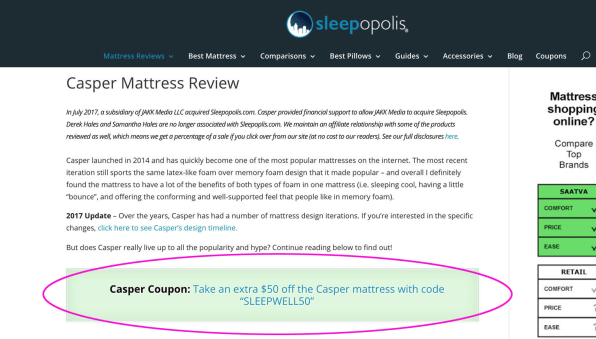
By early September, the updated Casper review amounted to an endorsement. “Overall my experience with Casper was very positive,” the new review concluded.
Casper’s battle had been hard fought, but it got what it wanted in the end. Now those who saw cute Casper ads on the subway and later Googled “casper mattress reviews” would no longer have their purchase momentum stymied by the first site they clicked on. They’d be waved along by Sleepopolis’s green light.
Casper had finally hammered out the last, most troublesome kink in the yawning purchase funnel that lured ever more traffic to its billion-dollar online storefront. The company could indeed claim, as it did on its site, to have “the internet’s favorite mattress.”
It had made very sure of that.
Fast Company , Read Full Story
(59)













